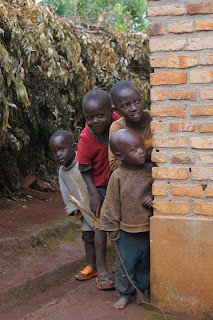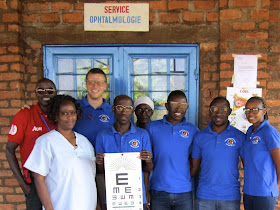In January 2014, the Department of Ophthalmology at Hope Africa University’s Kibuye Hospital opened its doors with the stated mission of ERADICATING PREVENTABLE BLINDNESS IN THE GREAT LAKES REGION OF CENTRAL AFRICA. What can I say, I like to dream big. We started with one crazy ophthalmologist, five untrained staff, an old paper eye chart and a big vision. Today, we have a capable staff running a pretty well-oiled clinic and specialized surgical theatre.
The Kibuye Eye team posing for a fun photo with an old box of glasses

First Retina Surgery in Burundi First Corneal Transplant at Kibuye
Most importantly, we are training the future of African healthcare professionals with over 100 medical and optometry students having completed rotations with us already. We have also just joined forces with a brand new ophthalmology residency program in Rwanda and together we plan to train the future eye surgeons and physicians of the Great Lakes. It’s a great start to what we hope to build into the major referral eye hospital for the region.
But our vision extends beyond that. Burundi (10 million plus) sits on top of Lake Tanganyika with Tanzania and Democratic Republic of Congo stretching along either side and Zambia 500 km away sitting to the south. Twelve million people live on the edges of the lake with virtually no access to eye care. There is good reason for this. This basin is geographically isolated, sitting in the heart of Africa with the impenetrable Congolese rainforest to the west and steep mountains rising out of the lake to the east leading to the vast East African plains of Tanzania. The region has been plagued by decades of war and instability making it one of the poorest, least developed places on earth, yet it remains one of the most densely populated areas of Africa. In other words, a virtual gold mine for any eager ophthalmologist willing to work around a few “road blocks”.
Our vision is to divide this population of roughly 20 million (Burundi + Tanganyika basin) into groups of 1 million and begin building primary eye care infrastructure (blue dots around the lake) with a floating referral eye hospital that can service the primary eye clinics around the entire lake. Today, I want to share with you how we are embarking on this voyage with our pilot program at Nundu in Fizi, South Kivu, DRC.
The "Master Plan" for the Tanganyika Basin
We first visited Nundu Free Methodist Hospital in Fizi in February 2015 at the invitation of missionaries working there. Fizi is home to 400,000+ people. During that visit, we asked the hospital to identify a healthcare professional to come train with us at Kibuye in order for them to have the knowledge base to begin providing very basic eye care and compiling surgical cases at Nundu. Dr. Songolo was selected and joined us for one month at Kibuye. He happened to arrive just as Burundi descended into political chaos in late spring, but he stuck it out and finished his month of training.
Between June and September he compiled a list of nearly 100 patients requiring sight-restoring surgery at Nundu. So this October we decided to pay him a visit. What does that entail?
Step 1, getting visas for the eye team. Since rules change constantly and there are many layers of bureaucracy this required trips to get passport photos, vehicle documents and immigration papers in the capitol 2.5 hours away. We received our visas just days before departure.
Step 2, packing everything you will need to to do eye surgery in a setting with no electricity and minimal running water. And note, this has to fit into or on top of the eye clinic’s 1986 Landcruiser, affectionately named “Umutama Kazi”, i.e. the “Old Lady”. This includes generators, surgical microscopes, surgical supplies, exam equipment, meds etc…
Step 3, decide if security is good enough to carry out the mission. This requires gathering intel from folks on the ground and from news sources. BBC was reporting an ambush of a military envoy delivering civil servants’ pay near a town we would be passing through. Eleven soldiers were killed and 20K stolen. Concerning. My Congolese contacts on the ground assured me this was to the north of the town. Security was “good” passing to the south where we needed to go. Hmm. Tough call.
Step 4 getting to and successfully crossing the border. This is VERY stressful. The Congolese border guards were particularly “thirsty” this day and worked us over trying to leverage extortions of one kind or another. Thankfully, the medical director from Nundu arrived as the “Old Lady” was about to be opened-up for full inspection. He had a word with the boss man who happened to have presbyopia. After an impromptu eye consult and a pair of reading glasses dispensed, we were on our way relatively unscathed.
Step 5, traversing the main “highway” of Eastern Congo linking north to south. This is a dirt road requiring one to ford at least three rivers where bridges have been washed out and to drive over several other bridges that look like they could be the next to go. The road weasels its way sandwiched between the water and the mountains sitting on the lake’s edge. From the border to Nundu it is about a three hour bone-rattling journey. There are road blocks along the way where one must negotiate and pay not inexpensive “tolls” for the use of their fine road.
We thanked God when we arrived safely. The previously mentioned missionaries were not at Nundu this time around, so we were hosted by the nationals. I slept in a tent on top of the Old Lady while the staff were given rooms in nearby homes. We were well fed by our hosts, but the diet is quite different than the Burundians'. Most of the team found it difficult with the daily fofo working to block the colon while some form of ensuing dysentery fought hard to overcome the fofo beazor. It really puts the bowels into a difficult paradoxical position, constipation with diarrhea. Is that possible? The bad news, there was no running water or privacy. I found myself wanting to go to the pit latrine nearest me, but I could not gather the courage to sit down as there were roaches of unnatural size emerging in large numbers from the crumbling concrete “toilet” and I feared some cess-pool dwelling creature would lay its fangs into my back-side if I got too close. Thus, my best option was using the toilet (with no seat or running water) in the Congolese house down the hill where I also took my bucket baths at night. The bathroom door was constructed of a see-through sheet hanging in the breeze-way between you and the living room where tout le monde (everyone) was listening to the muzungu no doubt work out his issues. The silhouette as I was taking a quick bucket bath at night by flashlight had to be equally frightful. But, I digress.
We got right to work the next day and by the end of the week we were able to preform 63 sight restoring surgeries and carry out screening clinics at Nundu and two other locations. We also met with local officials and other NGOs about bringing eye care services to Fizi going forward. There is currently no eye care of any kind, even in the territorial capital of Baraka. While in Baraka, I visited the MSF (Doctors Without Borders) hospital to discuss the situation there. Baraka felt like a town in the wild, wild west, only in Africa. Ironically, between Nundu and Baraka we drove through a UN refugee camp with over 10,000 Burundians living in make-shift dwellings on the side of the mountains. It brought home the fact that Burundi’s problems are no joke either. I can’t imagine how much fear one must feel to make the choice to flee to Eastern Congo of all places.
Happy post-op mamas who are no longer blind!
This man and his wife waited all week so we could do his other eye if we had time at the end.
As part of our team, we flew in a special friend from Tenwek Eye Unit (Kenya), Richard Tonui, to help train our team how to carry out surgical safaris in some of the world’s most challenging environments. Richard has over 25 years of eye care experience going to tough places in Africa. We also had two Congolese students with us, a medical student and an optometry student, both of whom did an amazing job helping us navigate local logistics and care for lots of patients. One of the students has agreed to help found our first eye clinic in Fizi when the time comes. He happens to be the brightest one to come through Kibuye to date.
Richard Tonui from Tenwek Hospital
Saying goodbyes to Nundu with a shout out to First Pres in Chattanooga, TN, for the fantastic eye clinic hats
Saying goodbye to Naomi, the daughter of the medical director
So, the future is exciting even though we are still just a drop in the bucket when it comes to the needs of this region, but Jesus loves to start with an act of faith as small as a mustard seed and see it grow. We pray this small seedling that we are trying to nurture in Fizi will grow-up and begin multiplying other clinics up and down Lake Tanganyika.
 And gratitude. Mail here at Kibuye is cherished. We receive your Christmas cards, and we display them for months on our walls, or even for years on bulletin boards.
And gratitude. Mail here at Kibuye is cherished. We receive your Christmas cards, and we display them for months on our walls, or even for years on bulletin boards. 



































